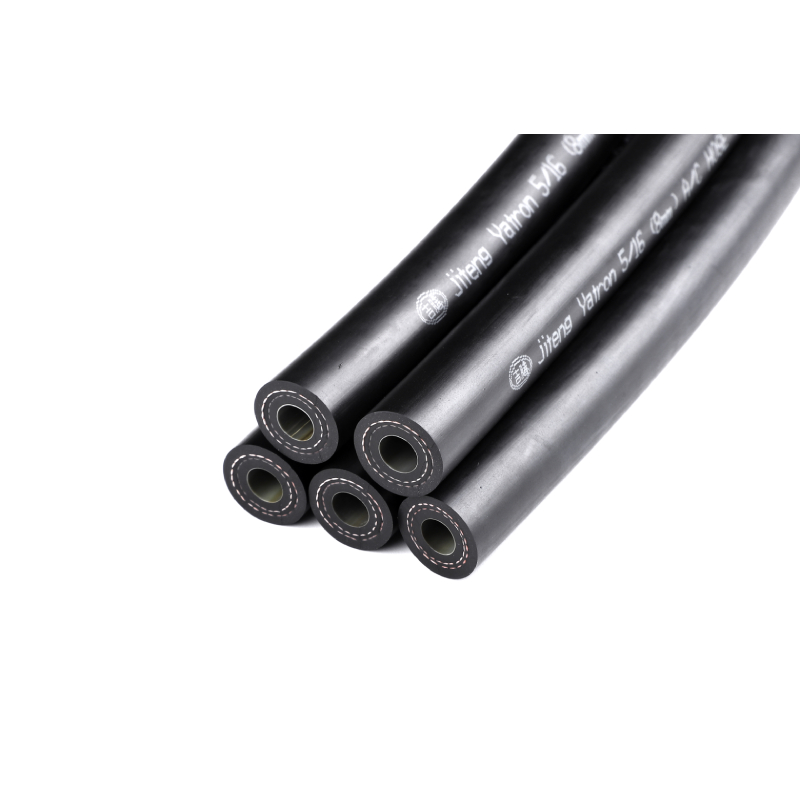Flexible Fuel Line Rubber Hose for Automotive Applications and Maintenance
Dec . 31, 2024 06:01 Back to list
Flexible Fuel Line Rubber Hose for Automotive Applications and Maintenance
Rubber Hose for Fuel Line A Critical Component in Automotive Engineering
In the intricate world of automotive engineering, every component plays a vital role in ensuring the vehicle operates smoothly and efficiently. Among these components, rubber hoses, particularly those designed for fuel lines, are essential for the safe and reliable transfer of fuel from the tank to the engine. This article explores the significance, properties, and maintenance of rubber hoses in fuel systems.
The Role of Rubber Hoses in Fuel Lines
Rubber hoses act as conduits for various fluids in vehicles, and fuel lines are no exception. They are responsible for carrying gasoline, diesel, or other fuels from the storage tank to the engine's fuel delivery system. Proper functioning of these hoses is crucial, as any failure can lead to leaks, engine performance issues, or even hazardous situations such as fire.
The design of rubber hoses for fuel lines is specifically tailored to withstand the challenges posed by fluctuating temperatures, pressure changes, and the corrosive nature of certain fuels. Manufacturers utilize high-quality rubber compounds, often reinforced with additional materials such as fabric or steel, to ensure longevity and durability.
Properties of Rubber Hoses for Fuel Lines
1. Chemical Resistance One of the primary attributes of rubber hoses used in fuel lines is their ability to resist the harsh chemical properties of various fuels. These hoses are often made from synthetic rubbers, such as nitrile or EPDM (ethylene propylene diene monomer), which provide excellent resistance to fuel and oil.
2. Flexibility and Durability Rubber hoses are designed to be flexible, allowing easy routing through the vehicle's engine bay. This flexibility minimizes stress on the fittings and connections. Additionally, the durability of rubber hoses ensures they can withstand vibrations and movement inherent in automotive applications.
3. Temperature Tolerance Fuel lines are subjected to a wide range of temperatures, from the cold fuel stored in the tank to the heat generated by the engine. Rubber hoses must maintain their integrity across these temperature extremes. High-quality hoses typically have a working temperature range that accommodates varying operating conditions.
rubber hose for fuel line

4. Compliance with Standards Automotive manufacturers must adhere to stringent safety and performance standards. Rubber hoses for fuel lines are often rigorously tested to meet regulatory requirements, ensuring they can withstand extreme conditions without failing.
Maintenance and Inspection
Regular maintenance and inspection of rubber hoses are imperative for vehicle safety and performance. Over time, exposure to fuel, heat, and environmental factors can lead to degradation. Here are some key points to consider for maintaining rubber hoses in fuel systems
- Visual Inspection Periodically inspect hoses for signs of wear, cracks, bulges, or leaks. Any irregularities should prompt immediate replacement.
- Check Connections Ensure all connections are secure and not leaking. Loose fittings can cause fuel to escape, posing fire hazards.
- Replace Old Hoses Rubber hoses have a lifespan that can vary based on usage and environment. It is advisable to replace them according to the manufacturer's recommendations or if they show signs of deterioration.
- Use Quality Parts When replacing rubber hoses, it is crucial to source high-quality components that meet or exceed OEM (Original Equipment Manufacturer) specifications. This ensures a proper fit and reliable performance.
Conclusion
Rubber hoses for fuel lines are indispensable elements of vehicle design and operation, serving a critical function in fuel transportation. Their chemical resistance, flexibility, and durability make them ideal for the rigors of automotive environments. However, they require regular inspection and maintenance to ensure safety and performance. By staying vigilant and prioritizing quality, vehicle owners can help ensure that their fuel systems operate efficiently and reliably, contributing to overall vehicle performance and safety on the road.
